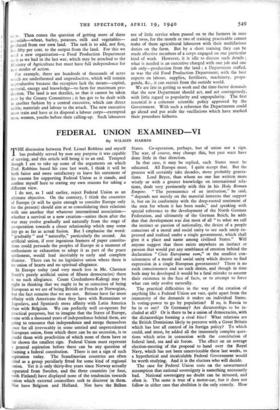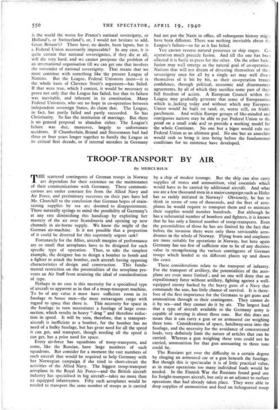FEDERAL UNION EXAMINED VI
By WILSON HARRIS
THE discussion between Prof. Lionel Robbins and myself has probably served by now any purpose it was capable of serving, and this article will bring it to an end. Tempted though I am to take up some of the arguments on which Prof. Robbins based his case last week, I think it will be both fairer and more satisfactory to leave his statement of his reasons for supporting Federal Union as it stands, and confine myself here to stating my own reasons for taking a different view.
I do not, as I said earlier, reject Federal Union as an ultimate objective. On the contrary, I think the countries of Europe (it will be quite enough to consider Europe only for the present) should aim at so consolidating their relations with one another that whatever international association— whether a survival or a new creation—unites them after the war may evolve gradually and naturally from the stage of co-operation towards a closer relationship which may some day go as far as actual fusion. But I emphasise the word: " gradually " and " naturally," particularly the second. An artificial union, if ever ingenious framers of paper constitu- tions could persuade the peoples of Europe in a moment of enthusiasm or exhaustion to adopt it as part of the peace settlement, would lead inevitably to early and complete disaster. There can be no legislative union where there is no union of hearts and no spiritual allegiance.
In Europe today (and very much less in Mr. Clarence Streit's purely artificial union of fifteen democracies) there is no such allegiance. Count Coudenhove-Kalergi may be right in thinking that we ought to be as conscious of being European as we are of being British or French or Norwegian, but the fact remains that we are not. Britons have far more affinity with Americans than they have with Rumanians or Jugoslays, and Spaniards more affinity with Latin America than with Belgium. We can perfectly well co-operate for practical purposes, but to imagine that the States of Europe, some with a thousand years of independence behind them, are going to renounce that independence and merge themselves once for all irrevocably in some untried and unprecedented European union, from which there can be no secession, is to credit them with proclivities of which none of them have so far shown the smallest sign. Federal Union must represent a general aspiration before there can be any question of framing a federal constitution. There is not a sign of such aspiration today. The Scandinavian countries are often cited as a group peculiarly fitted for some kind of regional anion. Yet it is only thirty-five years since Norway actually eparated from Sweden, and the three countries (or four, with Finland) have displayed none of the tendencies towards anion which external counsellors seek to discover in them. Nor have Belgium and Holland. Nor have the Balkan States. Co-operation, perhaps, but of union not a sign. The war, of course, may change this, but past wars have done little in that direction.
In that case, it may be replied, such States must be educated. All Europe must. I quite accept that. But the process will certainly take decades, more probably genera- tions. Lord Bryce, than whom no one has written more wisely or with a greater knowledge on international rela- tions, dealt very pertinently with this in his Holy Roman Empire. " The permanence of an institution," he said, " depends not merely on the material interests that support it, but on its conformity with the deep-rooted sentiment of the men for whom it has been made," and speaking with special reference to the development of the North German Federation, and ultimately of the German Reich, he adds that that development was due most of all " to what we call the instinct or passion of nationality, the desire of a people conscious of a moral and social unity to see such unity ex- pressed and realised under a single government, which shall give it a place and name among civilised States." Will anyone suggest that there exists anywhere an instinct or passion that would put any semblance of emotion behind the declaration " Civis Europaeus sum," or the smallest con- sciousness of a moral and social unity which desires to find expression in a single European government? There is no such consciousness and no such desire, and though in time both may be developed it would be a fatal mistake to assume their existence in the face of facts, or to attempt to force what can only evolve naturally.
The practical difficulties in the way of the creation of anything like a Federal Union are vast, quite apart from the immensity of the demands it makes on individual States. Is voting-power to go by population? If so, is Russia to be in or out? Or Germany? Are dictatorships to be in- cluded at all? Or is there to be a union of democracies, with the dictatorships forming a rival bloc? What relations are the British Dominions likely to preserve with a Great Britain which has lost all control of its foreign policy? To which could, and must, be added all the immensely complex ques- tions which arise in connexion with the constitution of federal land, sea and air forces. The effect on an average election-meeting of the proposal to hand over the Royal Navy, which has not been unserviceable these last weeks, to a hypothetical and incalculable Federal Government would be worth studying. And it is the electors who will decide.
The case for Federal Union rests on the unwarranted assumption that national sovereignty is something necessarily bad. National sovereignty no doubt can be misused, and often is. The same is true of a motor-car, but it does not follow in either case that abolition is the only remedy. How is the world the worse for France's national sovereignty, or Holland's, or Switzerland's, or, I would not hesitate to add, Great Britain's? There have, no doubt, been lapses, but is a Federal Union necessarily impeccable? In any case, it is quite certain that national sovereignties, if they die at all, will die very hard, and we cannot postpone the problem of an international organisation till we can get one that involves the surrender of national sovereignty. That means that we must continue with something like the present League of Nations. But the League, Federal Unionists insist—it is the whole basis of Clarence Streit's argument—has failed. If that were true, which I contest, it would be necessary to prove not only that the League has failed, but that its failure was inevitable, and inherent in its constitution. Many Federal Unionists, who see no hope in co-operation between independent sovereign States, do claim that. The League, in fact, has partly failed and partly succeeded. So has Christianity. So has the institution of marriage. But there is no general proposal to abandon either. The League's failure was due, moreover, largely to unfortunate accidents. If Chamberlain, Briand and Stresemann had had three or four years longer together to fortify the League in its critical first decade, or if internal mistakes in Germany had not put the Nazis in office, all subsequent history migl t have been different. There was nothing inevitable about ti League's failure—so far as it has failed.
You cannot reverse natural processes or skip stages. Co- operation much precede fusion. And till the one has bee i effected it is futile to press for the other. On the other ham fusion may well emerge as the natural goal of co-operatior. Nations that will not dream of divesting themselves of the r sovereignty once for all by a single act may well dive:: themselves of it bit by bit, as their co-operation breed, confidence, through political, economic and disarmament agreements, by all of which they sacrifice some part of their full freedom of action. A European Council within th, League may gradually generate that sense of Europeanisin which is jacking today and without which any European Union would- be built on sand, or, worse still, on friable parchment. 'And within Europe groups of like-minded and contiguous nations may be able to put Federal Union to the prOof on a small scale and so provide a working model for the whole Continent. No one but a bigot would rule out Federal Union as an ultimate goal. No one but an anarchist would seek to bring it into being before the fundamental conditions for its existence have developed.











































 Previous page
Previous page